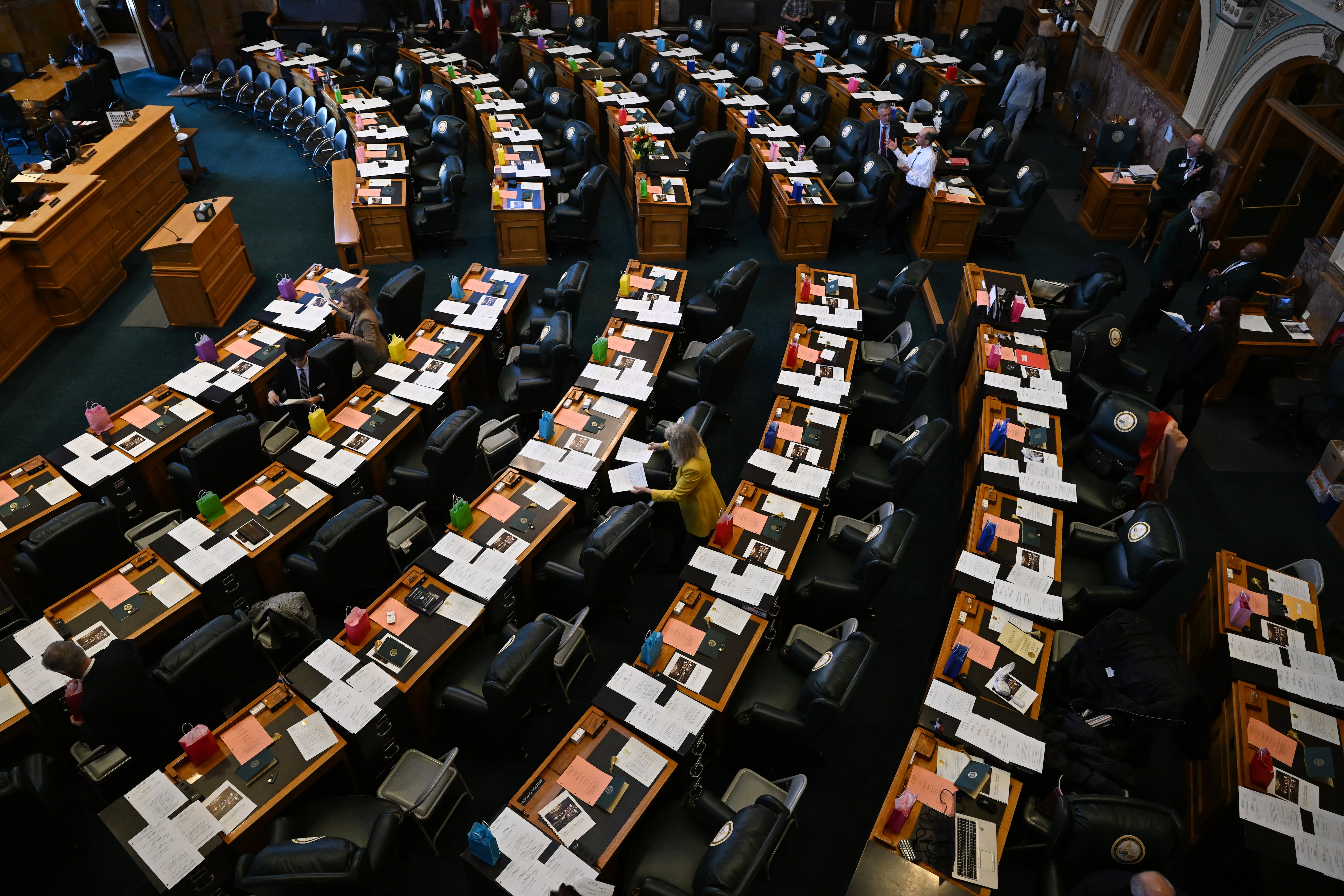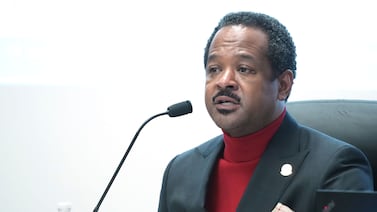Governors across the nation are calling for higher teaching salaries, seeking to bolster school staffs as many struggle to hire and hold onto educators.
The specifics of those proposals vary. But they have come from both Republican and Democratic governors in roughly a dozen states. Many governors discussed the issue during their State of the State addresses this year, according to the Education Commission of the States, which tracks education policy across the nation.
“What better way to strengthen our schools than to invest in the people on the frontlines of education – our teachers,” said Idaho Gov. Brad Little, a Republican, during his address. “Great teachers can motivate and change the trajectory of a student’s life. That is why my plan boosts starting teacher pay yet again.”
Delaware Gov. John Carney, a Democrat, said, “Right now, the competition for the best teachers in this region is more intense than ever.”
“We need to pay our teachers more to win the competition with surrounding states,” he added.
The calls come as states have experienced unexpectedly strong economies, and as schools have increasingly become a polarizing site for debates over how teachers approach certain subjects in the classroom. Their urgency is underscored as teachers have long been underpaid relative to others with similar educational backgrounds, and as high stress and other difficulties endured during the pandemic caused many educators to leave the field.
“When the revenues are there, and people are concerned about the pandemic learning loss issue, this isn’t the time for most politicians to run on a ‘I’m going to watch our pennies’ platform when it comes to schools,” said Jeffrey Henig, a professor at Columbia University’s Teachers College.
And for Republican governors in particular, the proposed salary jumps represent a defense against some political backlash.
“They are also trying to inoculate themselves against the charge that they’re anti-public schools because they’re simultaneously pushing school choice, vouchers, or tax-credit scholarship programs,” Henig added. “That provides an incentive for them to try to expand the pie rather than simply redistribute it.”
Governors have different abilities to change teacher pay. In most states, districts set teacher salaries, giving state legislators little direct influence, according to the National Council on Teacher Quality, a nonprofit research and policy group. In others, states set both minimum salaries and minimum salary schedules, which rise based on years of experience and other factors. (Districts can still choose to offer higher pay than the state-mandated minimums.)
Governors have called for different methods of increasing salaries. In Tennessee, for example, Republican Gov. Bill Lee has proposed legislation that would see minimum salaries for teachers jump from $41,000 to $50,000 over four years. In Missouri, Republican Gov. Mike Parson has advocated for a program to temporarily boost teacher salaries, while in Oklahoma Republican Gov. Kevin Stitt’s proposal would see $50 million put toward merit raises rather than an increase to all public school teacher salaries.
Meanwhile, U.S. Sen. Bernie Sanders of Vermont announced last week that he would introduce federal legislation to set a nationwide salary floor of $60,000 for educators, funded through changes to the estate tax. He called low teacher pay a “major crisis.”
For Republicans, pay raise proposals follow repeated criticisms of how teachers broach subjects of race, gender, and sexuality in classrooms. Those criticisms have garnered political upsides, drawing coverage and mobilizing their supporters — but they’ve simultaneously left state leaders open to rebukes for targeting institutions that remain especially popular at the local level.
State leaders tend to employ distinct messaging about education locally and nationally — with criticisms about schools and teachers unions centering on the nation’s education system, while discussions of local schools take a more pragmatic approach, Henig said.
“There’s this cleavage between what people say and think when they talk about schools in other places — there, they’re worried about teachers as ‘groomers’ and ‘What are they saying to my kid about gender?’” he said. “But when they think about their own teachers, their own schools, their own community, they’re much more likely to fall back on this traditional vision of the teacher as an ally of the parent.”
Though some education issues can be contentious, increasing teacher salaries tends to have widespread bipartisan support among voters, experts said.
More than 60% of parents, as well as 46% of Republicans and 70% of Democrats, felt public school teachers in their states should be paid higher than the current average, according to a national Education Next survey last year.
Competition between states spurs salary jumps
This year’s push is a continuation of trends that began in 2022, when many governors advocated for higher teacher pay, The 74 reported. Some states, like Alabama and New Mexico, enacted salary increases for educators, according to ECS’s state education policy tracker.
Competition between states can lead to a “bandwagon effect,” where one state raising teacher salaries can spur others to follow suit, said Sandra Vergari, a professor of education policy at the University at Albany.
“Moreover, states compete, and they’re ranked according to teacher salaries,” she said. “It doesn’t look good to be ranked low.”
Salary bumps have become more attainable as states experience continued economic growth, with some impacts of the pandemic receding. School funding is also reinforced by an influx of COVID-19 relief funds, which will sunset late next year.
Henig said most states have been “reasonably sensible” in treating the federal relief funds as a finite resource, and not allocating them toward expenses that will continue past their expiration.
But some are still worried. Michael Hansen, a senior fellow in the Brown Center on Education Policy at the Brookings Institution, said colleagues are “genuinely concerned” about the impact of the looming fiscal cliff amid an uncertain economic future.
They’re concerned “that right now we’re talking about teacher shortages,” he said. “But in two years, we may be talking about teacher layoffs.”
Hansen said modest or temporary raises could be a more cautious approach. He said he supported all teachers receiving higher pay, adding that targeted raises focused on the highest need positions and settings could be especially effective at relieving hiring shortages.
“Of course, that’s not a popular position,” Hansen said. “Unions have consistently resisted this … unless it comes with other negotiated positions.”
And the stakes extend beyond just schools, Vergari said. Attracting more teachers can naturally bolster a local economy, with companies choosing to invest in more educated areas and higher pay encouraging more people to move to or continue to reside in the area.
“This isn’t just about educating kids, this is about the overall wellbeing of your state economy and your overall society,” Vergari said. “If you can’t recruit and retain teachers, that is a serious, serious problem.”
Julian Shen-Berro is a reporter covering national issues. Contact him at jshen-berro@chalkbeat.org.






